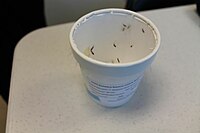
Photo from wikipedia
Background Leading transmission-blocking vaccine candidates such as Plasmodium falciparum surface protein 25 (Pfs25 gene) may undergo antigenic alterations which may render them ineffective or allele-specific. This study examines the level… Click to show full abstract
Background Leading transmission-blocking vaccine candidates such as Plasmodium falciparum surface protein 25 (Pfs25 gene) may undergo antigenic alterations which may render them ineffective or allele-specific. This study examines the level of genetic diversity, signature of selection and drivers of Pfs25 polymorphisms of parasites population in regions of western Kenya with varying malaria transmission intensities. Methods Dry blood spots (DBS) were collected in 2018 and 2019 from febrile outpatients with malaria at health facilities in malaria-endemic areas of Homa Bay, Kisumu (Chulaimbo) and the epidemic-prone highland area of Kisii. Parasites DNA were extracted from DBS using Chelex method. Species identification was performed using real-time PCR. The 460 base pairs (domains 1–4) of the Pfs25 were amplified and sequenced for a total of 180 P. falciparum-infected blood samples. Results Nine of ten polymorphic sites were identified for the first time. Overall, Pfs25 exhibited low nucleotide diversity (0.04×10−2) and low mutation frequencies (1.3% to 7.7%). Chulaimbo had the highest frequency (15.4%) of mutated sites followed by Kisii (6.7%) and Homa Bay (5.1%). Neutrality tests of Pfs25 variations showed significant negative values of Tajima’s D (-2.15, p<0.01) and Fu’s F (-10.91, p<0.001) statistics tests. Three loci pairs (123, 372), (364, 428) and (390, 394) were detected to be under linkage disequilibrium and none had history of recombination. These results suggested that purifying selection and inbreeding might be the drivers of the observed variation in Pfs25. Conclusion Given the low level of nucleotide diversity, it is unlikely that a Pfs25 antigen-based vaccine would be affected by antigenic variations. However, continued monitoring of Pfs25 immunogenic domain 3 for possible variants that might impact vaccine antibody binding is warranted.
Journal Title: PLoS ONE
Year Published: 2022
Link to full text (if available)
Share on Social Media: Sign Up to like & get
recommendations!